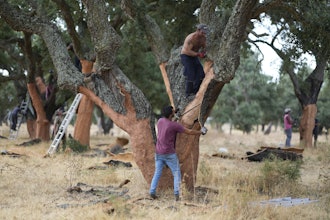
DES MOINES, Iowa (AP) — Eleven students from Brazil and Chile have filed a federal lawsuit accusing a northwest Iowa community college, a recruitment company, a pet food manufacturer and a packaging company of human trafficking and involuntary servitude.
The lawsuit filed Monday in the Northern District of Iowa says Western Iowa Tech Community College and J&L Staffing, both in Sioux City, lured the students to Iowa in 2019 under a work- and study- based visa exchange program only to push them into factory jobs that had no educational value and were unrelated to the field of study.
The lawsuit says the students were paid significantly less than U.S. employees and some of their money was deducted from their paychecks to fund kickbacks to the college and staffing agency. Two of the students are from Chile and nine are from Brazil.
Civil rights lawyer Roxanne Conlin said her clients remained in Iowa after the program ended and that the lawsuit seeks to require the college to make good on its promise to provide them with an education.
“It appears to us the documents are very clear what promises were made. It’s also clear that they never had any kind of a program to teach these students robotics or the culinary arts. They worked at a pet food manufacturing company on the line,” she said. “You cannot coerce or persuade people to go to work by making false promises and that’s what they did here.”
The jobs were at a Royal Canin pet food plant in North Sioux City, South Dakota, and Tur-Pak foods, a Sioux City company that packs and assembles food products.
Missouri-based Royal Canin said in an email response Thursday that it’s aware of the lawsuit but does not comment on pending litigation.
Conlin filed the lawsuit under the federal Trafficking Victims Protection Act; the Fair Labor Standards Act; and the Racketeer Influenced and Corrupt Organizations (RICO) Act. She also claims violations of the Iowa Wage Payment Collections Act.
She’s asking the court to prohibit the college and companies from any further participation in the work-and-study J-1 visa program, and to award the students monetary damages, provide them with the educational opportunities promised and compensate them for the past and future mental and emotional harm and anguish.
J&L Staffing and Tur-Pak Foods did not respond to messages seeking comment.
The students were enrolled in classes at the community college but segregated from the general student population, only taking classes with other Brazilians and Chileans in the J-1 visa program, the lawsuit alleges. It says college officials dictated when and where the students could work and under what conditions.
“Defendants collectively required plaintiffs to work under conditions that constituted involuntary servitude," the lawsuit alleges. ”Defendants took advantage of the natural isolation that occurred because plaintiffs were immigrants with limited English abilities.”
A spokeswoman for the community college denied the allegations.
“Western Iowa Tech Community College vehemently denies the claims brought forth in the lawsuit,” said Andrea Rohlena, the college's director of marketing. “These accusations are completely untrue, sensational, and offensive. We look forward to defending the college and its employees in district court and welcome the opportunity refute these malicious allegations.”
It is the second lawsuit to be filed against the community college, the recruiter and the companies. The first was filed in November on behalf of eight students from Chile who alleged they were brought to Iowa “into debt bondage at a Sioux City, Iowa, area food packaging plant and dog food factory by offering them a degree with free tuition, room, and board.”
The community college began its J-1 program in early 2019 when 60 students were brought to Iowa in July and August of that year. By November that year, it was under investigation by the U.S. State Department after an anonymous complaint was filed. In January 2020, the college issued a statement saying it had learned students in the program were unhappy and blamed a “failure to clarify expectations” and “a breakdown in communication” for some of the problems.
The community college discontinued the program in March 2020 citing the coronavirus pandemic. The college said it bought airline tickets for the students to return home. Conlin said many chose to remain in the United States.






















